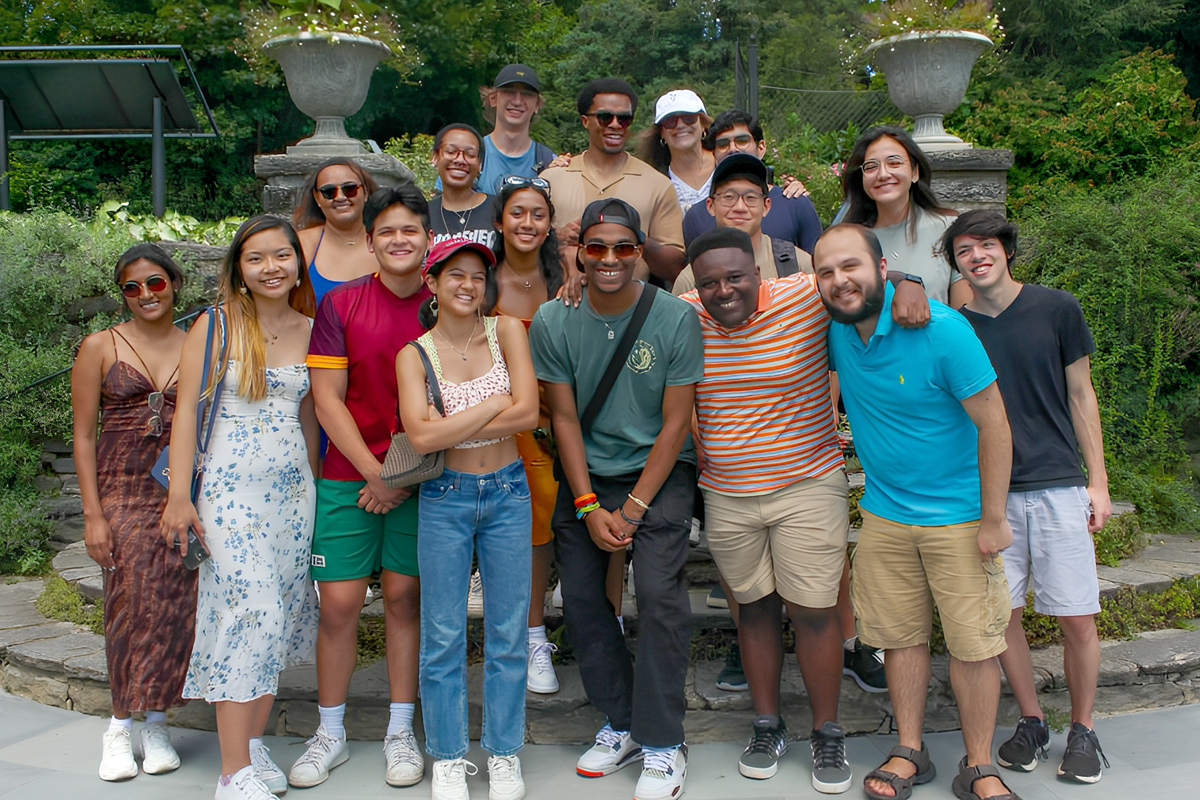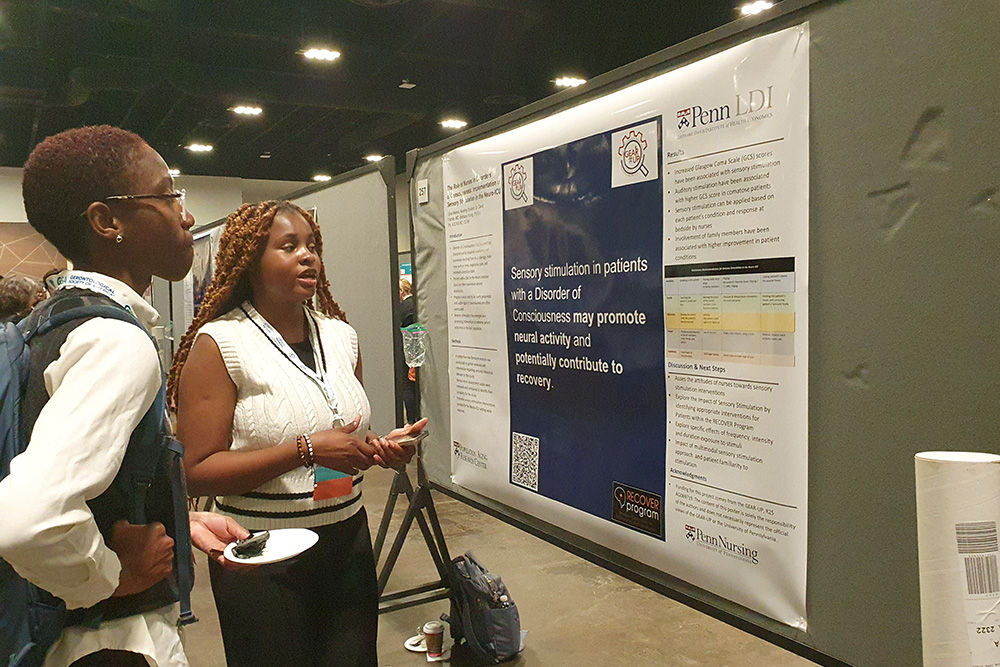“If you think about major societal challenges, a number are very predictable,” says Hans-Peter Kohler, Frederick J. Warren Professor of Demography and professor of sociology. “One of them is climate change. Another is population aging; this is a major domestic and global challenge.”
A worldwide increase in life expectancy and decrease in fertility rates led the World Health Organization to predict in 2022 that the proportion of the world’s population over 60 years old will nearly double between 2015 and 2050, from 12 to 22 percent. Related difficulties include providing health and long-term care needs, finding treatments for cognitive diseases like Alzheimer’s, and addressing health disparities in aging.
Yet studying or researching population aging is not part of the curriculum available to most college undergraduates, says Kohler.
He and colleagues Norma B. Coe and Rachel M. Werner of the Perelman School of Medicine responded by creating the Get Experience in Aging Research Undergraduate Program, or GEAR UP. The initiative is run by the Population Aging Research Center (PARC), which Kohler and Coe co-direct, and the Leonard Davis Institute of Health Economics (LDI), led by Werner. Established in the spring of 2022 with funding from the National Institute on Aging, GEAR UP supports research in STEM areas related to population aging by undergraduate students from underrepresented and disadvantaged backgrounds attending colleges across the country.
GEAR UP's first cohort had eight students, six of whom were from Penn. This year there are 13 students from nine schools, including five from Penn. They’re working on research ranging from the availability and effectiveness of care to health disparities and caregivers’ needs. The program is 15 months long, including two summers and the academic year between. It introduces students to researchers and topics, connects them with mentors to work on research initiatives, and provides workshops and social events.
Getting into Gear
Penn has a combination of strengths that make the program possible, says Kohler. PARC has been an active part of Penn Arts & Sciences for 30 years and has an international reach. When Kohler and Coe became co-directors five years ago, they implemented an official partnership with Penn Medicine and broadened the center’s research, taking full advantage of what Kohler describes as the University’s “impressive portfolio of research programs across a wide spectrum of population, and the impressive mentors related to that.”
Additionally, GEAR UP builds on the long-standing Summer Undergraduate Mentored Research (SUMR) program at LDI and Wharton’s Health Care Management Department, a three-month long training program celebrating its 25th anniversary this year. “Without that experience and infrastructure, GEAR UP would never have gotten off the ground,” Coe says. SUMR is already known to students at other colleges and universities, Kohler adds, including those where this level of research experience is comparatively rare.
The goal is to make population aging research more visible at the undergraduate level and make it accessible. We have the scholars and established research programs here to provide hands-on engagement and mentoring. It’s very cool to be engaged and see research coming alive.
During their first summer, GEAR UP students hear from Penn researchers and are introduced to topics and techniques. “There were daily seminars from people from Penn Medicine, Wharton, and sociology,” says Arturo Bardales, C’24, who is in the second cohort of GEAR UP fellows. “It’s very interesting hearing from the faculty about their experience and their current research.” To match researchers and students, each faculty mentor gives a project description, and the students contact them if interested. Once a match is made, the students join the research team that summer.
GEAR UP provides both instruction and social activities during the academic year. “It’s an opportunity to prep and get help, make sure people with different skills get on the same page,” says Bardales, of the data analysis workshops he is doing. Other events let students learn about each other’s research or just socialize. “We go out to eat as a group, we went to a conference in Seattle,” says Bardales. “It was definitely a bonding experience.”
During their second summer, the students continue doing research, now with enhanced knowledge and skills. “We hope during the second summer that the students get a much deeper involvement in the research, make greater contributions,” Coe says. “They may ultimately produce or take part in publications, presentations, or have the opportunity to do fieldwork.”
Case in point: With the financial support and guidance from GEAR UP mentors, Ashley Duchi, C’24, has presented a research poster at three conferences—something usually done by graduate students, postdocs, or Ph.D.s—including the Gerontological Society of America’s Advancing Diversity and Aging Research summit, part of the broader GSA conference. “I updated and improved my presentation each time,” she says. “It was a great opportunity.”
Hands-On Experience and Mentoring
Duchi has been working with the School of Nursing’s Adriana Perez, who is studying whether promoting physical activity will delay the onset of Alzheimer’s disease in older Latinos with mild cognitive impairment. “It’s been incredibly fulfilling,” says Duchi, who is majoring in health and societies and minoring in chemistry. “It’s clinical research, so I get a lot of time with participants, which is exactly what I wanted. I’m improving my social skills, which I believe are important for me as a pre-med, but I’m also learning practical skills.”
Though Duchi anticipated she would do research in college, she wasn’t sure she would want it to be part of her career. “GEAR UP exposed me to so many different career paths available in population aging, as well as the chance to network with established people in the field and see what they do, how they manage to keep balance in their life, for example, during their medical education and then as a physician.”
Bardales is a mathematical economics major with a statistics minor who wants to eventually earn a doctorate in economics. He has been working with the Population Studies Center’s Irma Elo, Tamsen and Michael Brown Presidential Professor of Sociology, and Jere Behrman, William R. Kenan Jr. Professor of Economics, on two projects in Chile addressing cognitive aging and health inequality. “I had a feeling I wanted to pursue research as a career, so it was great getting this experience,” he says.
For the cognitive aging project, they’re working with a team at the University of Texas Medical Branch that is conducting research in Mexico. “We’re comparing results between Mexico and Chile,” says Bardales, adding that he has benefited from collaborating with people from different backgrounds and from getting the essential training to pursue a research career. “I know [now] what the expectations are,” he says.
For Werner, the experiences Bardales and Duchi describe are all part of what makes GEAR UP a success. “The goal is to make population aging research more visible at the undergraduate level and make it accessible,” she says. “We have the scholars and established research programs here to provide hands-on engagement and mentoring. It’s very cool to be engaged and see research coming alive.”

Students projects in the second GEAR UP cohort included:
Arturo Bardales, C’24, Health and Cognitive Aging in Latin America
Aaliyah Campbell, C’26, Increasing Access to Gynecologic Oncology Care and Diversity in Clinical Trials
Faith Dempsey, C’26, Artificial Intelligence-Based Fidelity Monitoring Tool across Six Community Mental Health Agencies in Philadelphia
Josiah Drakes, Xavier University of Louisiana, Investigating MEAsures of SUrvival and REsidence among Persons with Dementia (I-MEASURED)
Gordon Elnager, Pomona College, Cognition in Malawi
Rafeel Jaman, Swarthmore College, I-TRANSFER Transition to Home Health Care
Payton Nashe, Vanderbilt University, ASCVD Risk Reduction Initiative and Penn Medicine Healthy Heart Program
Medha Romee Maitra, University of Georgia, Aging in Place for Older Veterans Living in Permanent Supportive Housing
Rhoodjinie Mentor, NU’25, The Role of Nurses: Sensory Stimulation as an Intervention for Patients with Disorders of Consciousness in the Neuro-ICU
Anam Rawoof, Bryn Mawr College, The Emotional and Social Needs of Elderly Caregivers of People Living with Dementia
Bianca Rodriguez-Diaz, C’25, Trends in Cognition and Behavior in People with MCI and Dementia During the Pandemic
Sebastian Spataro, Rice University, Disparities in Pharmacological Therapies for Chronic Low Back Pain Between 2010 and 2020
Kelly Su, Cornell University, Barriers and Facilitators of Clinical Research Participation among Racial and Ethnic Minoritized Adults with Psoriasis




